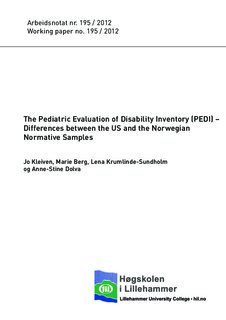The Pediatric Evaluation of Disability Inventory (PEDI) – Differences between the US and the Norwegian Normative Samples
| dc.contributor.author | Kleiven, Jo | |
| dc.contributor.author | Berg, Marie | |
| dc.contributor.author | Krumlinde-Sundholm, Lena | |
| dc.contributor.author | Dolva, Anne-Stine | |
| dc.date.accessioned | 2012-12-21T11:38:17Z | |
| dc.date.available | 2012-12-21T11:38:17Z | |
| dc.date.issued | 2012 | |
| dc.identifier.issn | 0806-8348 | |
| dc.identifier.uri | http://hdl.handle.net/11250/144862 | |
| dc.description.abstract | Summary: The Pediatric Evaluation of Disability Inventory (PEDI) is a standardized procedure for assessing childrens’ abilities, developed in the USA. It is widely used in child rehabilitation, also in Norway. A representative sample of Norwegian children in ten age groups is compared to the original American standardizing sample. On a large number of points, Norwegian and American children were shown to be different. In the assessment of Norwegian children, therefore, they should be compared to the Norwegian sample, not to the American norms for the PEDI test. | no_NO |
| dc.format.mimetype | application/pdf | |
| dc.language.iso | eng | no_NO |
| dc.publisher | Høgskolen i Lillehammer | no_NO |
| dc.relation.ispartofseries | Arbeidsnotat;195 | |
| dc.title | The Pediatric Evaluation of Disability Inventory (PEDI) – Differences between the US and the Norwegian Normative Samples | no_NO |
| dc.type | Working paper | no_NO |
Tilhørende fil(er)
Denne innførselen finnes i følgende samling(er)
-
Lillehammer Arbeidsnotat [69]
Avsluttet
